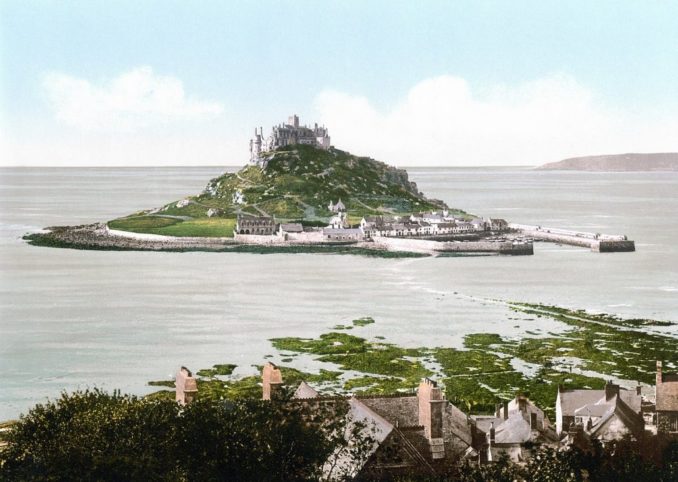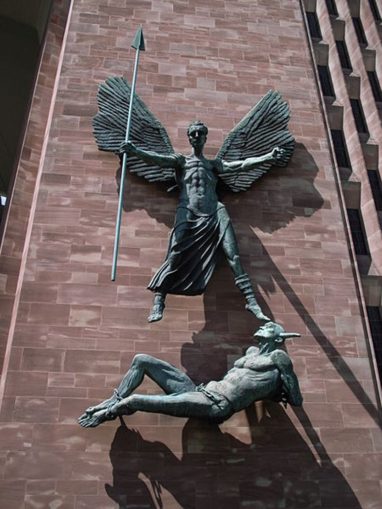
Unknown author, Public domain, via Wikimedia Commons
The Lord’s Prayer
Our Father, which art in heaven, Hallowed be thy Name, Thy kingdom come, Thy will be done, in earth as it is in heaven. Give us this day our daily bread; And forgive us our trespasses, As we forgive them that trespass against us; And lead us not into temptation, But deliver us from evil. Amen.
People often seem to me to make rather heavy weather of ‘And lead us not into temptation’: surely God isn’t going to try and trap us?. I’ve never seen the difficulty. Take the two clauses together, and see a psalm-like parallelism, given that in poetry especially, but also in prose, figures of speech are used, and so the first of these clauses can be seen as using Irony or a kind of Litotes whose puzzlement is resolved by the second: ‘But deliver us from evil’. Besides, The Adversative Conjunction (‘but’ – or rather ‘But…’ ) suggests a ‘Far be it from Thee to do that…’ as in Genesis 18, where Abraham (‘which am but dust and ashes’) presumes to bandy words with ‘the Judge of all the world’ over the Divine Intention to slay all within the city of Sodom. I’m too unskilled in Ancient History to be able to give examples, but didn’t both the Greeks and the Romans in their mythology have their Heroes ‘tested’ by the Gods, or their agents the Ἐρινύες – The Furies – and tested often ‘to destruction’?
In one’s panglossian moods, neither of these clauses seems relevant or necessary: life is pretty good, we’re coasting along without mishap, the sky is clear and sunny, ‘all’s well with the world’. Then something harrowing occurs; out of this clear sky we notice that black cloud ‘no bigger than a man’s hand’ but ominous and growing fast. ‘When sorrows come, they come not single spies but in battalions’. So then, perhaps too late, reality breaks in and Corporal Jones’s urgent tones are heard, ‘Don’t panic! Don’t panic!’
One mistake is, surely, to imagine that the world in which we live is of its own nature good, kind, and benevolent towards us – always: despite our knowledge that Nature is ‘red in tooth and claw’, and, that for most of the animal kingdom, it’s a simple case of ‘kill or be killed’; eat or be eaten. Now if ever, surely, we know how easily evil can be upon us, to the point of overwhelming us. Our complacency, naiveté, purblindness, allow us to be surprised by events – again and again. Another mistake, is to imagine that we can, and must, rely only upon ourselves, that there is no deus ex machina to descend in triumph and make everything right. Enlightenment ‘Laws of Nature’, had left The Almighty no room for manoeuvre, indeed, no room for Him effectually at all in the Deistic Universe: as Laplace said, ‘Nous n’avons pas besoin de cette hypothèse-là’
In the opening decade of the Twentieth Century there was, I think, a generalised feeling of optimism, that enabled people to turn away from Christianity, or at least treat it as a kind of optional extra, of no real significance in their lives, apart from as a kind of pleasant Antique, inert behind the locked glass door of a ‘Cabinet of Curiosities’, to which they were accustomed, and which they liked to have around. Then came 1914…
Because the Reformation had abolished the idea of purgatory (not just the abuse of the doctrine: Martin Luther, as an Augustinian Monk, should, above all men, have known that ‘abusus non tollet usus’!) and forbidden any prayer for the Dead, that industrialised killing for four years left people with no apparent means of seeking consolation in their grief, no familiar ritual to assuage it, no body to deal seemlily and affectionately with: hence the growth of interest in Spiritualism in the years after ‘The Great War’. Nor was it much better for the grieving and suffering after the Second World War, when even more hideous examples of the demonic cruelty we humans are capable of came to light: think not only Dachau and Auschwitz but also Japan’s ‘Unit 731’. Small wonder men returning from captivity in Japan were unable to talk of it (some literally, as a prison-camp guard had cut off the tongue), many driven mad (like poor ‘Joe Butts’ down here, who would stride along cursing and profaning furiously, stopping to pick up any cigarette-end, sometimes, to the terror of a small child, stopping in mid-flow, to bend down and pat the terrified youngster’s head, while uttering incongruous words of gentle affection).
Paradoxically, some of the unbelievable evils of those years between 1939 and 1945 that so horrified us then: abortion, forced sterilisation,‘euthanasia’, ‘spare-part’ surgery… have since become common-place, rather than beyond the pale (after all, ‘harvesting’ of stem-cells can be so beneficial, and, surely, a woman should not be denied the right to do what she wants with her body (the body within her, being re-classified as ‘the products of conception’), nor should the incapacitated be denied the right to have their lives end in a quiet, dignified way…!)
In the years that followed 1917/8, another ‘false god’ caught the minds of many: Karl Marx’s baneful ideology gripped intellectuals and bien-pensants throughout Europe, and grasped the word ‘Peace’ as one of its means of furthering itself: small wonder ‘The Bright Young Things’ turned instead to determined frivolity. Their ‘revolution’ was turning away from things ‘Victorian’ – more stridently so even than their Edwardian parents had done (over-painting french-polished mahogany in white, flinging open the curtains that had preserved those rich colours from fading)– and embracing every whim of American fashion, particularly if it would be deemed – I may not write the word – ****** :Dvorak’s String Quartet was not entitled ‘American Quartet’: that is as much a subsequent euphemism as re-titling Mendelssohn’s Third Symphony ‘Scottish’ (he or his publishers called it ‘Scotch’) was earlier. Women no longer wore bustles let alone ‘stays or corsets, or ‘put up their hair’: they had their hair crop-cut (‘shingled’), wore ‘binders’, and ‘shift-dresses’ almost as short as the later mini-dress, to look androgynous, and smoked; Josephine Baker appeared on stage in Paris, naked apart from a ‘skirt’ of suggestive rubber bananas and danced her ‘danse sauvage’. Drug-taking became ‘a thing’ – hence Noel Coward’s play ‘The Vortex’ (although ‘Vorticism’ itself seems to have deliquesced, amid all the other -isms) – so that, later perhaps, ‘Chips’ Channon would record in his Diaries adding a good splosh of Benzedrine to the alcohol to make his parties more vibrant (‘The Crystal Methodist’ and Keith Vaz were not, it seems, pioneers). The androgyny was, of course a feature of Berlin’s 1930’s Weimar Republic Berlin, as was the cross-dressing: in all, a complete lack of restraint – indeed, a welcome of all once regarded as inimical, ‘not the thing’, disgusting, immoral…and Western Art – Writing and Music, as well as painting, sculpture, and Ceramics – turned to the grotesque, the ugly, the shocking, the repellent, the inane, the contradictory (‘Ceci n’est pas une pipe’ and the Urinal)
Into this Chaos ‘slouched’ two or three bringers of Order: a Georgian would-be Priest, an Austrian would-be-Artist, and an Italian Journalist. Russia, Germany, Italy, and, indeed, the rest of Europe, indeed, the World still bear the scars of their malign activity. The Austrian must have been the World’s first successful ‘virtue-signaller’: celibate, vegetarian, WWI hero (‘of course, the records were not subsequently ‘redacted’), dog-lover… enjoying cream cakes while ‘his’ Country starved?Never, surely, was W.B. Yeats’ prognostication better exemplified (‘The best lack all conviction/ the worst are full of passionate intensity’) or his ‘Second Coming’s ‘rough beast’.
The 1960’s with the overarching fear so many had of ‘Mutually Assured Destruction’, brought its own ‘Bright Young Things’ its own collective shrug of shoulders – ‘whatever floats our boat’, ‘if it’s your bag…’
So the 1980’s – 1990’s; who’s counting? – brought us yet more assurance: ‘We know what we’re doing!’ ‘We have your best interests at heart!’ ‘Don’t be so up-tight!’, ‘If it doesn’t harm anyone else, what’s the problem?’ and so on, and so self-servingly on.
In 1988, I’d accepted a post in a school in Brighton, so we’d moved from mid-Cornwall to Kemp Town. Brighton was then not just the queerest place in these Isles, but was beginning – proudly – to claim to be the World’s AIDS capital (not long to be displaced by, I think, Edinburgh!). The Government felt obliged to spend a lot of our money on erecting (sorry!) hoardings everywhere, with the strange message ‘DON’T DIE of IGNORANCE’ (at least one of which had the felt-tipped addition, ‘become a Lesbian’). For some reason, Government felt inhibited from spelling it out that, intravenous drug-use, anal-intercourse, the exchange of body-fluids, were all factors in this new ‘plague’ – so, furthered the ‘ignorance’: certainly in the sense of ignoring a glaring fact. Only Bigots could call it ‘the Gay Plague’! Yet it was only young ‘single’ men who contracted this disease…
“Now the serpent was more subtil than any beast of the field which the Lord God had made. And he said unto the woman, Yea, hath God said, Ye shall not eat of every tree of the garden? And the woman said unto the serpent, We may eat of the fruit of the trees of the garden: but of the fruit of the tree which is in the midst of the garden, God hath said, Ye shall not eat of it, neither shall ye touch it, lest ye die. And the serpent said unto the woman, Ye shall not surely die: for God doth know that in the day ye eat thereof, then your eyes shall be opened, and ye shall be as gods, knowing good and evil. And when the woman saw that the tree was good for food, and that it was pleasant to the eyes, and a tree to be desired to make one wise, she took of the fruit thereof, and did eat, and gave also unto her husband with her; and he did eat.”
‘Lead us not into temptation ‘Dear Lord’, but ‘Deliver us from evil’. C.S. Lewis, somewhere (‘Screwtape’? ‘Letters to Malcolm’?) suggests that the last deceit of the Devil might be to convince us that he doesn’t exist. Whether ‘evil’ in The Lord’s Prayer (Matthew 6.9ff; Luke 11.2ff) be construed as individual/personal (o ponhros – the Evil One) or in a more generalised, abstract sense (Evil) makes little difference: we need God’s help to protect us from ourselves and also from the malice of others. Ponhros (evil/the Evil One) has its root in weight/toil/oppression – the ‘toils’ of those ‘thorns and thistles’ that were to be Adam’s curse. This petition might, I think, legitimately be re-phrased as: Lord, lead us away from temptation, and protect us from evil
Centuries ago, St. Bernard of Cluny wrote these lines:
The world is very evil,
The times are waxing late,
Be sober and keep vigil,
The Judge is at the gate;
The Judge Who comes in mercy,
The Judge Who comes with might,
Who comes to end the evil,
Who comes to crown the right.
Why St. Michael’s Mount at the head of this piece? The great Archangel, whose name means ‘Who is like God?’ is seen as God’s Champion was, for centuries seen by the Cornish as their Patron Saint, until Lefty-inspired Mebyon Kernow blanked him in favour of the Miner (and NUM-member?) St. Piran. Yet even the regicide poet Milton though never, to anyone’s knowledge having set foot in West Penwith, took up the faint memory of St. Michael having appeared above his Mount, re-purposing the Monastery as a bulwark against Catholic Spain:
Where thou perhaps under the whelming tide
Visit’st the bottom of the monstrous world;
Or whether thou to our moist vows deny’d,
Sleep’st by the fable of Bellerus old,
Where the great vision of the guarded Mount
Looks toward Namancos and Bayona’s hold;
Look homeward Angel now, and melt with ruth.
And, O ye Dolphins, waft the haples youth.
At the Dissolution, The Mount was found to have possessed a meagre armoury – for protection against the Barbary pirates? – as well as sundry relics, vestments, vessels etcetera. In addition, they would have needed archangelic assistance to fend off the plunder-seeking slave-traders.
‘God helps those who help themselves’ is not necessarily as meaning that, in effect, ‘we’re on our own’: better, perhaps, seen as a meaning that while God will not necessarily intervene to save us from our own supine stupidity, if we show some willingness ourselves to resist the evil, He will augment our puny efforts, with perhaps regulated doses of His own Almighty power.

Steve Cadman, CC BY-SA 2.0, via Wikimedia Commons
© Jethro 2021
The Goodnight Vienna Audio file
Audio Player



